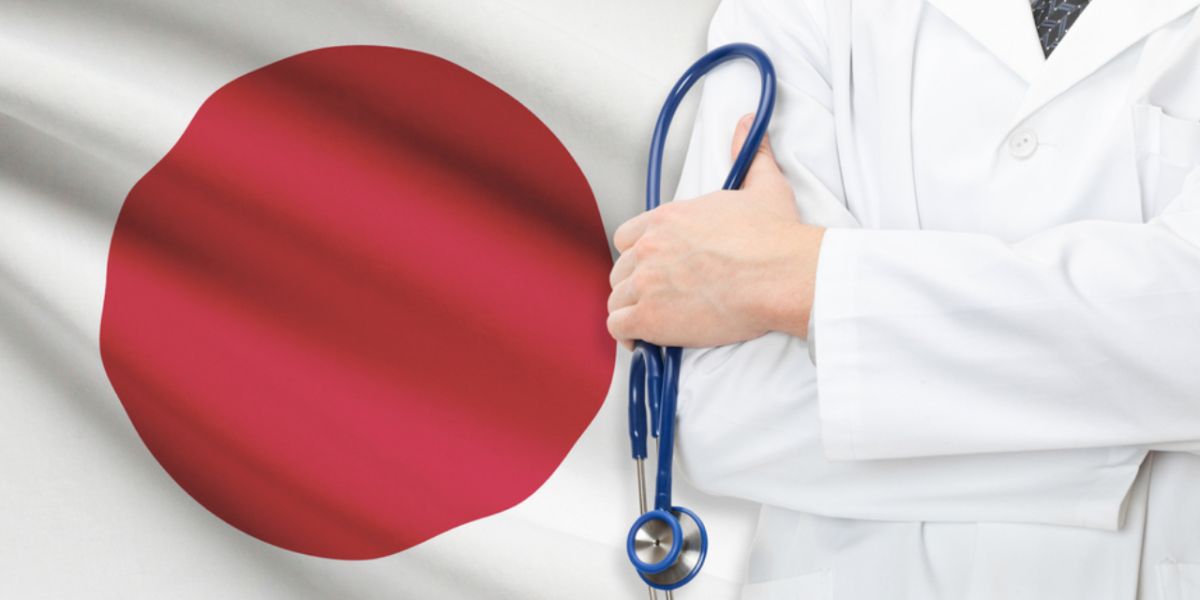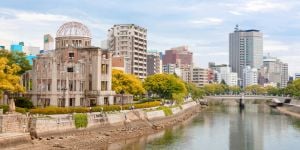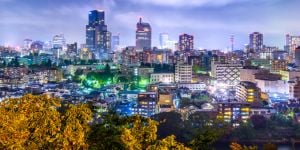
The Japanese healthcare system is renowned for its efficiency and modernity. It counts for numerous doctors and various specialties, especially in the big cities. Japanese public medical health insurance is available to all residents of Japan, whether they work or not. If you are planning to move to Japan or are already living there, you should know how to deal with the healthcare system in Japan.
Universal Healthcare System in Japan
Japan's public healthcare system is renowned for its exceptional satisfaction level and the top-notch medical services provided through a universal health insurance system.
The public healthcare system in Japan provides coverage for all citizens, regardless of age, from infants to the elderly. The system is divided into three main categories to cater to different groups of people:
- National Health Insurance: for self-employed individuals, agricultural workers, and those who are unemployed;
- Late-stage Elderly Healthcare: for individuals aged 75 and above;
- Employee Insurance: for employees and their dependents if applicable, and is further divided into different types based on the company's size. The employer pays part of the insurance premiums in this system, ensuring everyone can access healthcare services.
By immigrating to Japan with a work visa, study visa, or Working Holiday Visa, you will automatically be affiliated with Japanese health insurance. In addition, you can subscribe to private health insurance.
National Health Insurance (NHI)
The National Health Insurance System is a medical insurance system that is designed for residents who do not have other medical insurance coverage, such as employee insurance or the medical care system for the elderly. It includes municipal national health insurance, which is provided by prefectures and municipalities, as well as national health insurance associations that are organized by industry.
Specifically, it is for individuals who do not work for a particular company, such as self-employed individuals, farmers, homemakers, pensioners, and unemployed individuals. These individuals can enroll in NHI through their local government.
NHI does not consider the concept of "dependents". For instance, if a self-employed person and their spouse both need coverage, they must enroll and be insured separately.
The amount of insurance premiums to be paid under NHI is determined based on various factors, including the income from the previous year, the number of participants in the insurance scheme, and their age. As a result, the specific amount paid per person can vary depending on the prefecture and city in which they reside.
Good to know: NHI payments for expats in Japan
The easiest way to pay for your Japanese health insurance is to go to a Konbini (a mini-market open 24 hours a day). Your city hall will send you slips with the monthly amount to pay.
The Konbini staff will stamp the slip corresponding to the monthly payment. This is a very convenient system. Furthermore, konbini can be found everywhere in Japan, even in remote areas.
Late-stage elderly healthcare
Late-stage elderly healthcare is a public insurance system designed to lessen the financial burden of medical expenses for elderly individuals. It offers different payment options based on income levels to ensure fairness and accessibility.
Individuals aged 75 or above are automatically enrolled in this system and must only pay 10% of their medical expenses. Those aged 65 or older with specific disabilities can also join this system.
Premiums for this system are reviewed every 2 years by the Wide-Area Federation for Late-Stage Senior Citizen's Health Care. Premiums can be collected through "special collection" from public pensions or other payment methods like slips.
Those receiving more than 180,000 yen per year from public pensions have their premiums deducted automatically. Those with an annual taxable income of 1,450,000 yen or more or 3,830,000 yen or more must pay 30% of the premiums.
Individuals with a taxable income of 280,000 yen or more and a "pension income plus other total income" of 2 million yen or more for a single-person household or 3.2 million yen or more for multiple households must pay 20% of the total cost at the counter.
Health Insurance or Employee Insurance
Health insurance or Employee insurance is a type of medical insurance provided to employees and their dependents, such as spouses, parents, and children. The number of dependents does not affect the cost of insurance premiums. Hence, enrolling family members in the same health insurance plan can help save money.
Unlike NHI, which requires the employee to pay the total amount of insurance premiums, Health Insurance or Employee Insurance premiums are split equally between the employee and their employer.
Three main types of health insurance are available: Health Insurance Association, Kyokai Kenpo, and Seamen's Insurance.
Insurance premiums are determined based on the employee's average monthly salary from April to June. The coverage period for health insurance is from September of one year to August of the following year.
What is covered by health insurance in Japan?
As mentioned above, when you go to a clinic or hospital for treatment and have an insurance card, the amount you pay at the counter is only a portion of the total medical costs. This amount depends on your co-payment rate. Generally, the co-payment rate is 30%.
- The health insurance premiums are split 50/50 between the employee and employer;
- The medical institution bills 70% of the money to the “examination and payment institution”;
- Primary school children and individuals aged 70–74 have a co-payment ratio of 20%;
- Individuals aged 75 and over have a co-payment ratio of 10%;
- Individuals aged 70 and over with an income equivalent to the working-age population pay 30% (source: https://www.med.or.jp/people/info/kaifo/system/).
National Health Insurance covers several health items, including:
- Medical consultations;
- Medication;
- Hospitalization;
- Surgical operations;
- Dental care (consultations and dental surgery);
- Medical treatments and tests.
The public medical insurance system reduces the burden of medical expenses when receiving treatment. However, the public health insurance system does not cover all medical costs, and some items are not covered.
For example, suppose you are hospitalized in a private room or a small group room. In that case, you will have to pay the total cost of the extra bed and medical fees such as advanced medical technology fees are not covered by public medical insurance.
In case of a funeral, the health insurance will provide a lump sum to the deceased's family.
In Japan, pregnancy is not considered a disease. Therefore, it is not covered by health insurance. Instead, the municipalities take over this responsibility. In practice, pregnant women have to register at their city hall to declare their pregnancy. In addition to the health booklet, they will receive vouchers that make them entitled to free consultations. Local authorities may also grant a sum of money (the amount varies from one municipality to another).
The demographic challenge for Japan's healthcare system
Japan's population is aging, and this has become a significant issue for the government. The recent pandemic has only made things worse for Japan's demographic problem. According to the Japanese Ministry of Health, Labour and Welfare, women live on average 87 years, and men 81 years. Life expectancy is high, but fertility has been declining over the years. In 2023, Japan's birth rate stood at 7.013 births per 1000 individuals, indicating a decrease of 1.35% compared to the previous year, 2022. The birth rate in Japan is too low to ensure demographic regeneration.
Japan is far from being the only country concerned. A declining birth rate also affects other developed countries, including Croatia, Finland, Germany, South Korea, and the United States. The health crisis has even led to a worldwide baby flop, which is quite problematic for health systems.
The reasons behind the demographic decline in Japan
The problem of population decline in Japan has been a concern for a long time, and the causes include the decrease in birth rates and challenges within society. Several reasons explain the low birth rate in Japan, including quality of life and economic factors.
Regarding maternity and paternity leave, Japan lags far behind other countries. Middle-class women often lose their independence and career aspirations after getting married. Raising children mainly falls on women with little support from their husbands, as their husbands are too tired from work. Hence, many women delay marriage, and some choose to remain single.
In addition, married couples in Japan also tend to have fewer children for various reasons. Medical insurance does not cover many childbirth costs, making it expensive for couples. The cost of raising a child has significantly increased in Tokyo and other major cities.
Finding childcare is also challenging, especially for children over three. Even when available, childcare services in Japan are unaffordable for most middle-class couples. Financial considerations make it difficult for these couples to have more than one child.
Nowadays, Japanese women can claim independence and work a lot but are still underpaid compared to their male counterparts. In 2021, if the average salary for male employees was 100, female employees earned 75.2 in comparison.
Moreover, societal problems such as high suicide rates and a lack of interest in the opposite sex also influence the low birth rate in Japan. These societal issues are unique to Japan and exist in other developed countries.
Impacts of an aging population on Japan's healthcare system
The year 2025 is a crucial milestone in Japan's demographic landscape. It marks the beginning of a significant increase in the elderly population, which is projected to reach its peak in 2040. As time progresses, the number of individuals aged 65 and older and those aged 75 and older will continue to rise steadily. This demographic shift poses numerous challenges for the country, including rising healthcare costs, labor shortages, and the long-term sustainability of the social security system (source: https://www.mhlw.go.jp/stf/newpage_21481.html).
The rise in the number of elderly individuals will lead to an increase in medical costs because older people often have chronic and prolonged medical conditions that require frequent and extensive medical care. In 2011, national healthcare costs reached around 39 trillion yen, and they will reach approximately 60 trillion yen by 2025.
In FY2021, the total medical expenditure in the country reached 45,359.9 billion yen, which was 2,069.4 billion yen higher than the previous year, representing a growth of 4.8%. On an individual level, the per capita national medical care expenditure was 358,800 yen, showing an increase of 18,200 yen or 5.3% compared to the previous year's 340,600 yen. Additionally, the ratio of national healthcare expenditure to the gross domestic product (GDP) was 8.18%, slightly higher than the previous year's 7.99% (source: https://www.mhlw.go.jp/toukei/saikin/hw/k-iryohi/21/dl/kekka.pdf).
This problem also leads to medical personnel shortages. With the increasing number of older people suffering from illnesses, there is a natural demand for more healthcare professionals. However, Japan is facing a declining birthrate and an aging population, which means that the working-age population that supports older people is decreasing.
The shortage of medical personnel due to the declining birthrate and aging population profoundly impacts the healthcare industry. Maintaining a stable supply of doctors, nurses, and other medical professionals becomes increasingly challenging.
This imbalance between the demand for healthcare services and the availability of skilled personnel creates a significant hurdle in addressing the increasing medical needs of the aging population.
Registering for health insurance in Japan
Registration for Employee Insurance
In the case of Employee Insurance, to notify the Japan Pension Service about acquiring an insured qualification, employers must submit a "Notification of Acquisition of Insured Qualification". Your employer will handle the necessary paperwork for this procedure.
When you join a public pension system for the first time, excluding mutual aid associations, you will receive a notification containing your basic pension number.
If you work in a business office that falls under the jurisdiction of the National Health Insurance Association, also known as the "Kenpo Association", you will be issued a "Health Insurance Insured Identity Card" by the Japan Health Insurance Association.
Additionally, suppose you have a spouse, child, or any other dependents who meet the requirements to become dependent. In that case, you should inform your employer and submit a "Health Insurance Dependent Notification". The Health Insurance Association will issue you a "Health Insurance Card for Family (Dependents)" (source: https://www.nenkin.go.jp/service/kounen/tekiyo/hihokensha1/20150422.html).
Registration for National Health Insurance (NHI)
People who are not eligible for the NHI in Japan:
- Those who have other medical insurance or dependents;
- Those who receive public assistance;
- Those who enroll in the Late-Stage Senior Citizen's Health Care System;
- Foreign nationals residing in Japan for a short period (less than 90 days).
To register for NHI, you must submit the required documents to your municipality's NHI office within 14 days. The procedure is simple. If you have just arrived in Japan, you can do it when you register at the city hall to obtain your resident card.
The same procedure applies to students and people on a Working Holiday Visa in Japan (WHV). The affiliation to the NHI is done at the time of your registration at the city hall.
To learn more about the application procedures and required documents, refer to the website of your prefectural/municipal government or the National Health Insurance Association.
If you move from one city to another within Japan, you will need to apply for a new insurance card at the city hall of your new place of residence (source: https://www.mhlw.go.jp/stf/newpage_21539.html).
Good to know: Addressing COVID-19
If your income has been affected by the new coronavirus, you may be eligible for a reduction, exemption, or deferment of your National Health Insurance premiums.
Furthermore, if you contract the virus, you may be entitled to sickness and injury benefits as per the ordinance. Contact your municipality's NHI counter, including special wards, to inquire about municipal national health insurance. For the National Health Insurance Association, contact the association directly or the counter in your prefecture (source: https://www.mhlw.go.jp/stf/seisakunitsuite/bunya/kenkou_iryou/iryouhoken/koukikourei/index_00002.html).
The cost of healthcare in Japan
As mentioned above, public health insurance is mandatory for all individuals in Japan, both for Japanese nationals and foreign residents. You can visit any hospital or clinic without scheduling an appointment if you get sick or injured.
Generally, you are responsible for 30% of the treatment expenses, while public insurance covers the remaining 70%. However, if the treatment is not covered by insurance, you will have to pay the entire cost, which is a stressful burden.
If you subscribe to complementary health insurance, it will take care of the remaining 30%. However, this 30% will not be covered by Social Security in your home country. It is up to you to take out a complementary health insurance policy (generally, international health insurance) to cover your needs.
Consultation with a doctor in Japan
Being sick abroad can add extra stress, especially if you don't speak the language. You can find helpful information about doctors who speak English, French, or other languages on your embassy's website. Also, consider associations of foreign residents, and don't forget word-of-mouth. Your friends may know doctors who speak your language.
Unless you go to clinics or facilities with staff who speak your language or consult practitioners from your country, the doctors you meet probably speak only Japanese. If you also speak Japanese, that's fair enough! But if you speak little or no Japanese at all and you cannot explain your issue to the health professionals, we're providing you with a small but helpful lexicon below.
General medical terms:
医者 (isha) = doctor
患者 (kanja) = patient
熱病 (netsubyou) = fever
調子 (choushi) = physical condition, state of health
診察 (shinsatsu) = medical check-up
痛み (itami) = pain / 痛む (itamu) = to have pain
痛いです(itai desu) = I am in pain / it hurts
病気 (byouki) = sickness / 病気です。(byouki desu) = I am sick
アレルギー (arerugii) = allergy
風邪 (kaze) = cold
風邪をひきました。(kaze wo hikimashita) = I have a cold / I caught a cold
胃 (i) = belly, stomach / 胃が痛いです。(i ga itai desu) = I have a stomachache
気分が悪いです。(kibun ga warui desu) = I feel sick.
ここが痛いです。(koko ga itai desu) = I feel bad here.
医療 (iryou), 治療 (chiryou) = medical treatment, care.
薬 (kusuri) = medicine
薬屋 (kusuriya) 薬局 (yakkyoku) = pharmacy.
Good to know:
There are two types of medicine outlets in Japan:
- Pharmacies that dispense medicine with a prescription;
- Drugstores – where you can buy medicine without a prescription.
Useful languages to explain pain
The Japanese language uses an innumerable number of onomatopoeias. These are widely used in everyday language. Not surprisingly, many of them are used to explain what you are suffering from. Knowing these onomatopoeias will help you to describe your pain precisely, and, therefore, to communicate better with your doctor.
ガンガン (gangan) = loud, intense noise. This is the sound of a headache.
頭がガンガンします。(atama ga gangan shimasu) = I have a headache.
ゾクゾク(zokuzoku) = chills. To describe a feverish state.
ゾクゾクします。(zokuzok shimasu) = I have chills.
ムカムカ (mukamuka) = nausea
ムカムカします。(mukamuka shimasu) = I feel nauseous
ズキズキ (zukizuki) = sharp pain, for example, when you have a toothache.
歯がズキズキ痛んでいます。(ha ga zukizuki itandeimasu) = my tooth hurts a lot.
Useful links:
Ministry of Health, Labour and Welfare of Japan
Find a French or English-speaking doctor; find a hospital in Tokyo and Kyoto
Japan public healthcare system
Building a sustainable social security system in Japan (Japanese)
We do our best to provide accurate and up to date information. However, if you have noticed any inaccuracies in this article, please let us know in the comments section below.











